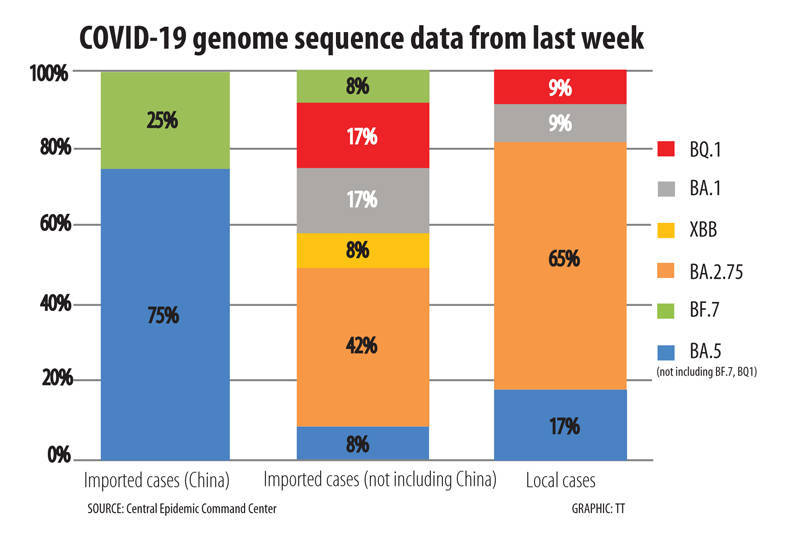《TAIPEI TIMES》CECC reports Taiwan’s first case of XBB.1.5 strain

END OF SERIES: As the first generation of Pfizer-BioNTech COVID-19 vaccines are set to expire, the CECC would no longer offer them to children younger than four years old
By Lee I-chia / Staff reporter
The Central Epidemic Command Center (CECC) yesterday reported the nation’s first case of a person infected with the Omicron XBB.1.5 subvariant of SARS-CoV-2.
The Taiwanese man in his 20s arrived from Canada on Jan. 22, said Centers for Disease Control (CDC) Deputy Director-General Philip Lo (羅一鈞), who is deputy head of the CECC’s medical response division.
He tested positive after reporting having a runny nose and muscle soreness while in airport quarantine, Lo said.
The XBB.1.5 subvariant is the dominant strain in the US, but there is no evidence to suggest that it causes more severe illness than other Omicron subvariants, he said, adding that the center would continue to monitor the strain.
Genome sequencing data from last week showed that the Omicron BA.2.75 subvariant remains the dominant strain in Taiwan, making up 65 percent of the sequenced local cases, he said.
The previously dominant BA.5 strain only accounted for 17 percent of the local cases last week, while BQ.1 and BA.2 were each responsible for 9 percent, Lo said.
Of the sequenced imported cases (not including arrivals from China), up to 42 percent had BA.2.75, followed by 17 percent each with the BQ.1 and BA.2 strains, and 8 percent each with the BF.7, XBB and BA.5 strains, he said.
The CECC yesterday reported 16,391 new local cases, 259 imported cases and 63 deaths, adding that the daily case count was 26 percent lower than on Monday last week.
Deputy Minister of Health and Welfare Victor Wang (王必勝), who heads the center, said that 183,745 new local cases were reported last week, which was 32.1 percent higher than the previous week.
The center attributed the rise to the Lunar New Year long holiday from the prior week, as people might have delayed testing themselves or seeking treatment over the holiday, he said.
Another possible factor was increased exposure to COVID-19 during the holiday, he said.
Separately, the center would no longer offer first-generation Pfizer-BioNTech COVID-19 vaccines as a first dose for children aged six months to four years old, and teenagers aged 12 to 17 effective immediately, said CDC Deputy Director-General Chuang Jen-hsiang (莊人祥), who is the CECC spokesman.
Children younger than four years old are required to receive the same brand of vaccines as part of their primary series, four and eight weeks apart, but as the original Pfizer-BioNtech vaccines are set to expire next month and in April, they would not be able to use them, he said.
The Moderna vaccine is still available, he added.
For teenagers aged 12 to 17 — who are also required to receive vaccines of the same brand as their primary series, two doses, 12 weeks apart — should get the Novavax vaccine instead, he said.
Children aged five to 11, who are to receive two doses four weeks apart, would still be eligible for the Pfizer-BioNTech vaccine until April 1, he said, adding that they would be able to get the Moderna vaccine after that date.
Unvaccinated adults aged 18 or older who wish to receive the Pfizer-BioNTech vaccine for their primary series — two doses, four weeks apart — must get their first dose by Feb. 22, after which they would receive the Novavax vaccine as their second dose, Chuang said.
He said that 10.2 percent of people aged 65 to 74, and 17.7 percent of people aged 75 and older have not received any dose of a COVID-19 vaccine.
As vaccination status and age are among the key factors affecting COVID-19 mortality, the center urged people to encourage elderly family members to get vaccinated to prevent severe illness or death from COVID-19.
新聞來源:TAIPEI TIMES












